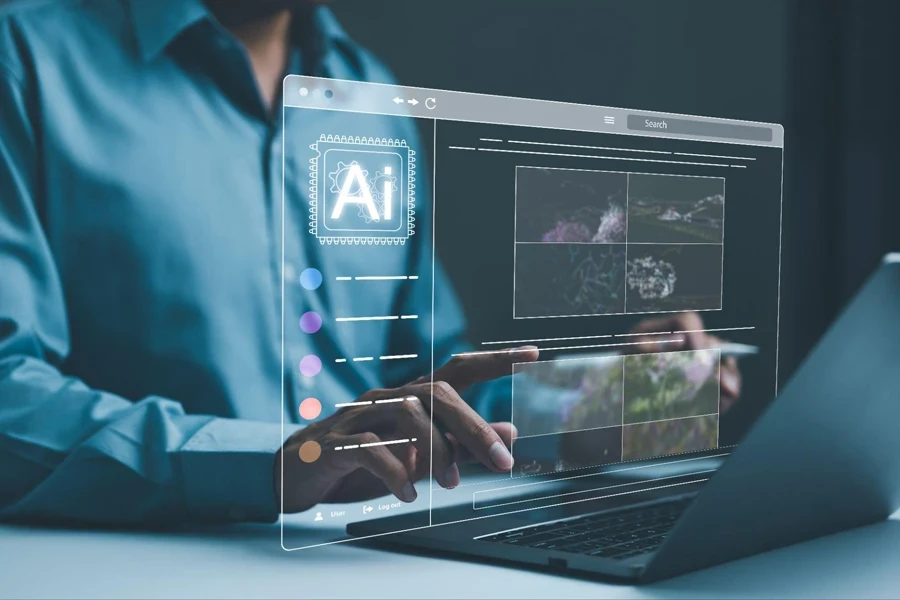In the modern economy, artificial intelligence (AI) is not just a technological advancement; it’s a transformative force reshaping industries and opening doors to new entrepreneurial ventures. As AI technology permeates various sectors, from healthcare to finance, it presents a unique opportunity for innovative entrepreneurs to tap into its potential and craft business models that promise not only to meet the needs of today but also to pave the way for future prosperity. These seven AI-driven business ideas are not mere speculations; they are viable pathways to financial success, each tailored to solve distinct challenges with precision and efficiency. Embracing these opportunities could be the key to unlocking immense economic potential and securing a prosperous future in the digital age.
Table of Contents
Revolutionizing Healthcare with AI
Innovations in Recruitment: AI at Work
Personalized Learning Through AI
The Frontier of AI in Content Creation
Transforming Agriculture with Smart AI Solutions
Conclusion: Seizing AI Opportunities for Financial Success
Revolutionizing Healthcare with AI
The healthcare sector stands on the brink of a revolution, with AI leading the charge towards more personalized and preventive care. Imagine a world where wearable devices not only track vital signs but also predict potential health issues before they escalate. Such innovations could drastically change how we approach health management. Entrepreneurs can capitalize on this by developing AI-driven systems that offer real-time insights and early warnings based on an individual’s lifestyle, genetics, and current health conditions.

These systems promise not only enhanced patient care but also lucrative revenue streams through subscription models and partnerships with medical institutions. However, the journey is not without challenges. Entrepreneurs must navigate complex regulatory landscapes and address privacy concerns while investing significantly in research and development to stay ahead.
Innovations in Recruitment: AI at Work
The recruitment industry, historically burdened by high costs and inefficiencies, is ripe for disruption by artificial intelligence. An AI-powered talent matching platform can redefine how employers connect with potential candidates by analyzing a broad range of factors, including skills, experience, and even subtle nuances like workplace habits. This approach allows for a more precise match, potentially reducing turnover rates and cutting recruitment expenses significantly.

Entrepreneurs can derive revenue from subscription fees charged to employers and from offering premium features to job seekers. Additionally, the platform can provide valuable data insights to HR departments, further monetizing the service. Despite its potential, this AI application faces challenges such as ensuring data accuracy and navigating the competitive landscape of traditional job boards and networking platforms, not to mention the legal intricacies related to anti-discrimination laws.
Personalized Learning Through AI
Traditional e-learning platforms often adopt a one-size-fits-all approach, which can hinder the learning process for individuals with unique needs and preferences. By integrating AI, entrepreneurs can create platforms that adapt to the learning styles, paces, and strengths of each student, offering a truly personalized educational experience. This can be applied across various markets, including K-12 education, professional development, and even recreational learning for hobbies.

Revenue can be generated through subscription fees, direct course purchases, and partnerships with educational institutions seeking to enhance their online offerings. However, creating high-quality content that maintains educational effectiveness remains a significant challenge, alongside standing out in a crowded market dominated by established e-learning platforms.
The Frontier of AI in Content Creation
In the digital age, content is undeniably king. AI is set to revolutionize content creation by automating and enhancing the production of written, audio, and visual content. An AI-driven platform can assist journalists, bloggers, marketers, and even filmmakers by generating content that is not only high in quality but also optimized for search engines, readability, and audience engagement.

Entrepreneurs can tap into this lucrative market through various revenue models, including subscription fees, pay-per-content schemes, and licensing deals with marketing agencies. However, maintaining the nuanced understanding and creativity of human content creators poses a significant challenge, as does navigating the complexities of copyright laws and ensuring the authenticity and quality of AI-generated content.
Transforming Agriculture with Smart AI Solutions
The agricultural sector is under increasing pressure to produce more with less, as global population growth continues to strain available resources. AI can be a game-changer in this field by optimizing farm operations and increasing crop yields. Entrepreneurs can develop AI solutions like drones equipped with advanced sensors and algorithms that analyze soil quality, weather conditions, and crop health.

These technologies provide farmers with precise, actionable insights, allowing for more informed decision-making and sustainable practices. The revenue potential in smart agriculture includes software licenses, data analytics services, and consultancy fees. Despite the promise, challenges such as high initial costs, the complexity of integrating AI into traditional farming operations, and the hurdle of achieving widespread adoption among farmers persist.
Conclusion: Seizing AI Opportunities for Financial Success
As we explore the transformative impact of artificial intelligence across various industries, it becomes evident that AI is not just a technological innovation but a cornerstone of future economic success. The seven AI-driven business ideas discussed here—from personalized healthcare and automated recruitment to smart agriculture and AI-enhanced content creation—represent just a glimpse of the potential that AI holds. For entrepreneurs willing to navigate the challenges and invest in these emerging technologies, the rewards can be substantial. The key to success lies in identifying gaps in existing markets where AI can offer superior solutions and boldly seizing the opportunities to innovate. As the digital landscape continues to evolve, now is the time to invest in AI and position oneself at the forefront of this exciting era of technological entrepreneurship.




